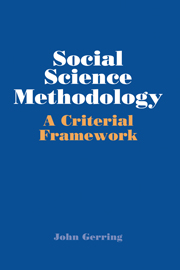4 - Strategies of Definition
Published online by Cambridge University Press: 05 June 2012
Summary
There is … progress in the social sciences, but it is much slower [than in the natural sciences], and not at all animated by the same information flow and optimistic spirit. Cooperation is sluggish at best; even genuine discoveries are often obscured by bitter ideological disputes. For the most part, anthropologists, economists, sociologists, and political scientists fail to understand and encourage one another.… Split into independent cadres, they stress precision in words within their specialty but seldom speak the same technical language from one specialty to the next. A great many even enjoy the resulting overall atmosphere of chaos, mistaking it for creative ferment.
–Edward O. WilsonIt matters how we define words, not merely that we define them. Yet, as we have seen in the previous chapter, the task of concept formation is irreducibly complex, involving claims for coherence, operationalization, validity, field utility, resonance, contextual range, parsimony, and analytic/empirical utility (see Table 3.1). Not surprisingly, natural scientists like E. O. Wilson find the lexicon of social science to be confusing and unstable terrain, an apparently orderless field of churning terms, definitions, and referents. Three problems, in particular, plague the social science lexicon: homonymy (multiple meanings for the same term), synonymy (different terms with the same, or overlapping, meanings), and instability (unpredictable changes in the foregoing). As a result, studies of the same subject appear to be talking about different things, and studies of different subjects appear to be talking about the same thing.
Information
- Type
- Chapter
- Information
- Social Science MethodologyA Criterial Framework, pp. 65 - 86Publisher: Cambridge University PressPrint publication year: 2001
Accessibility standard: Unknown
Why this information is here
This section outlines the accessibility features of this content - including support for screen readers, full keyboard navigation and high-contrast display options. This may not be relevant for you.Accessibility Information
- 1
- Cited by
